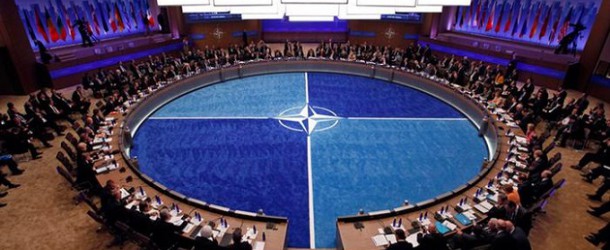Foreign ministers of the member states to the North Atlantic military block met in Brussels on 1-4 April 2014. By the end of day one alliance members decided to strengthen defense capabilities of the NATO member states in light of the crisis in Ukraine. Furthermore, Foreign Ministers have agreed to completely halt practical cooperation with Russia in military and civil fields and initiated steps aimed at enhancing Ukraine’s defense capability. NATO Secretary-General Anders Fog Rasmussen stated that alliance was prepared to deploy mobile instructor groups in Ukraine. “ITAR-TASS” quoted Ukraine’s acting Foreign Minister Andrey Deshitsa saying that first group of NATO instructors would be arriving to the country in the coming week. In the meantime, NATO is also sending experts to Ukraine to evaluate the country’s needs in terms of foreign aid, including technical assistance (see: МИД Украины: безопасность в стране будет обсуждаться в рамках комиссии Украина-НАТО / ”Информационное телеграфное агентство России”, 31 March 2014).
Nevertheless, representatives of the member states to the alliance made no decision regarding deployment of additional military contingent in the NATO countries lying in Russia’s immediate neighborhood. This development has disappointed representatives of Poland and the Baltic states that seek NATO’s permanent military presence on their soil.
Second day saw deliberations by the delegates from 15 states – U.S., Poland, Britain, Romania, Estonia, Latvia, Slovakia, Denmark, Norway, Hungary, Canada, Turkey, Czech Republic, Ukraine and Lithuania – addressing NATO’s expansion policy, achievements of the alliance and development prospects. In the discussions it was particularly emphasized that the alliance has no intentions of abandoning its expansion policy and is ready to embrace any European nation, provided this country was ready, corresponded to necessary criteria and was willing to accept the common values recognized by other member states – freedom, democracy and security.
There is a belief in many Western countries, especially in the political quarters of the member states of the alliance, that eastward expansion of NATO has bolstered European stability and the spread of democracy. In his statement on the occasion of anniversary of NATO Enlargement U.S. Secretary of State said, “NATO’s Open Door policy hasn’t just allowed more members into its ranks. It has expanded democracy, prosperity and stability in Europe and opened new opportunities to advance security and prosperity around the globe” (see: Джон Керри: ”Двери НАТО открыты для любой страны” / ”Голос Америки”, 1 April 2014).
Topics suggested for discussions during the two-day meeting for the NATO member state representatives demonstrated a connection between Ukraine crisis and the policy of alliance’s expansion. The question whether such connection indeed exists has been widely speculated upon in the Western expert circles. The main difference on this subject is the position on the efficiency of NATO’s eastward expansion.
In an interview with Voice of America Pat Buchanan, known as a conservative politician and columnist said, “America and Europe made a grave mistake by taking NATO to Russia “backyard”. I have always opposed Georgia and Ukraine’s membership to NATO. Membership of these countries is of no value to NATO. NATO should not have advanced toward Russia’s borders as the Russian troops retreated eastward in the wake of the “Cold War” (see: Михаил Гуткин, Виктория Купчинецкая. Расширение НАТО и аннексия Крыма – есть ли связь? / ”Голос Америки”, 3 April 2014).
Thomas Gram, former Senior Director for Russia on the U.S. National Security Council Staff in the George W. Bush administration, also elaborated on the prospects of Georgia and Ukraine joining NATO in an interview with the Voice of America, “I believe mistake was made in recent years, when NATO failed to limit its eastward expansion… This is a highly sensitive issue for Russia and it may affect the context of the situation. I have always thought that after the Baltic countries the alliance should have stopped its expansion by building a fence extending from Poland to the Balkans” (see: Михаил Гуткин. Виктория Купчинецкая. Расширение НАТО и аннексия Крыма – есть ли связь? / ”Голос Америки”, 3 April 2014). Nevertheless, most Western experts support NATO’s enlargement and this position is only being consolidated in the context of Ukraine crisis.
According to former U.S. envoy to NATO and presently president of Chicago Council Ivo Daalder, “In the aftermath of not just incursion by Russia into territory of another sovereign state but occupation of a part of the country NATO must not stop bolstering security of member states. Therefore, we debate expediency of permanent dislocation of American military contingent. Everything has to be done for enhancing defense capabilities of Poland and the Baltic states through temporary deployment of troops there” (see: Михаил Гуткин. Виктория Купчинецкая. Расширение НАТО и аннексия Крыма – есть ли связь? / ”Голос Америки”, 3 April 2014).
Senior official in the Ronald Reagan and Bill Clinton administrations, Stephen Sestanovich said in an interview with the Voice America that “if it would not be for the NATO eastward expansion, anxiety and panic in the Eastern Europe would have been much greater… I suppose existence of NATO as a giant alliance contributes to stabilization of the situation (see: «Максимализм» во внешней политике США / ”Голос Америки”, 28 March 2014).
Since the recent events of the alliance are held under the theme of defending Ukraine and as retaliation to Russia’s actions, this may provoke new confrontations in other parts of the post-Soviet space as opposed to the Western claims that their efforts are aimed at alleviating the crisis. Launching of military exercises involving Ukraine, in the environment where Russia is seen as an aggressor, would undoubtedly mount pressure both on the region and on West-Russia relations.
Under the current geopolitical circumstances renewed eastward expansion of NATO must not be excluded. This development would possibly provoke new military confrontations. Presumably a threat of emergence of new confrontations impacts expansion plans of the alliance and basically obstructs their implementation.
Given that developments around the world condition one another and are interconnected, Ukraine crisis and deepening West-Russia standoff can be regarded in the context NATO’s eastward expansion.
Bedel AHMADOV
PhD in Sociology




















































